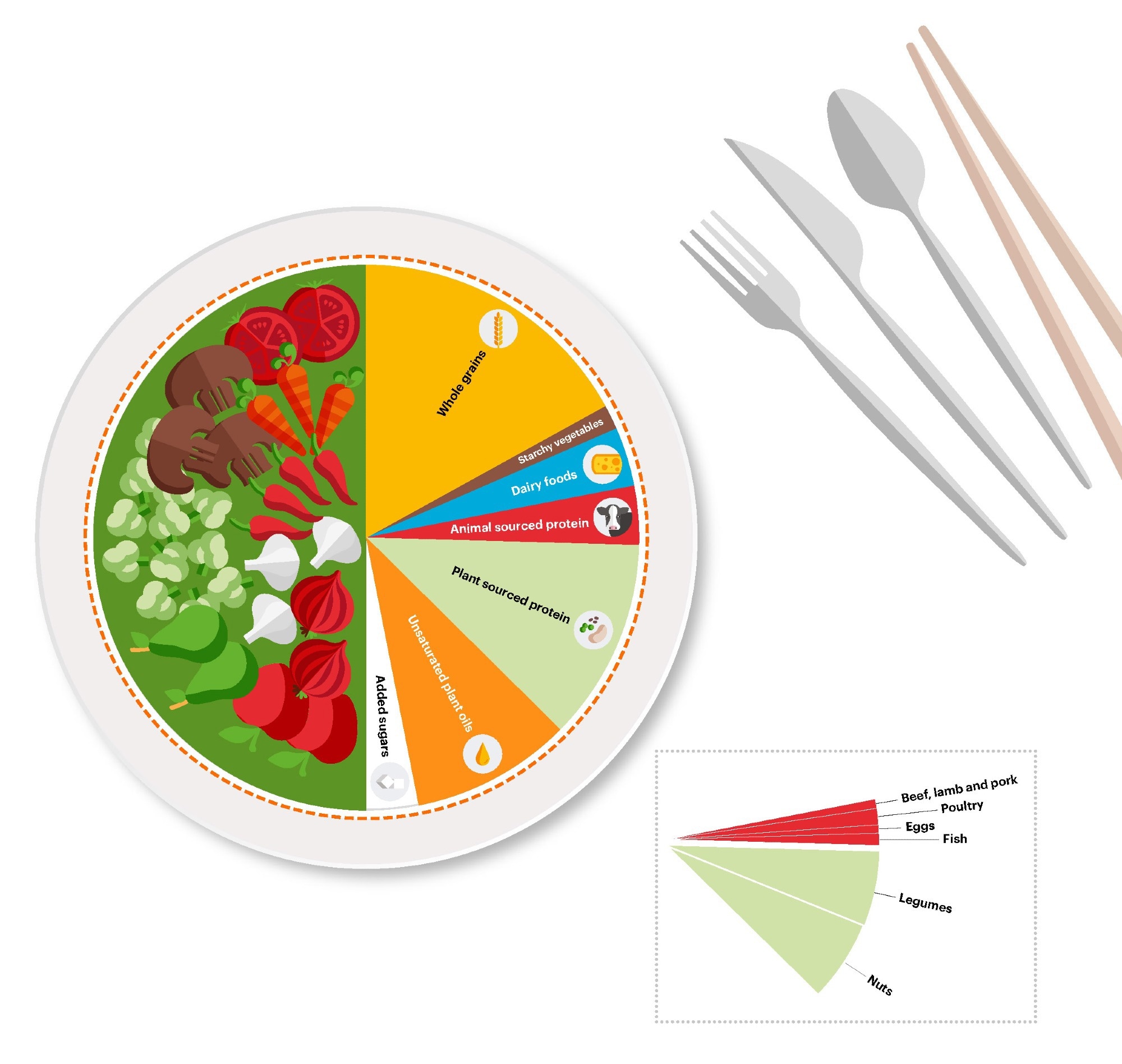Could a planet-friendly diet also shield your brain? New study links EAT-Lancet eating patterns to lower dementia risk, but only if your genes play along.
 Study: Associations between the EAT-Lancet planetary health diet and incident dementia. Image Credit: marilyn barbone / Shutterstock
Study: Associations between the EAT-Lancet planetary health diet and incident dementia. Image Credit: marilyn barbone / Shutterstock
In a recent study in The Journal of Prevention of Alzheimer's Disease, researchers used a large (n = 25,898, age = 45–73 yrs) Swedish cohort to elucidate any relationships between the EAT-Lancet diet and dementia incidence. The impacts of covariates, including APOE ε4 status, were also estimated. Study findings revealed that the EAT-Lancet diet does not exacerbate dementia risk, instead potentially reducing incident dementia in non-carriers of the APOE ε4 gene.
Background
Advances in medical research and clinical interventions are allowing humans to live longer than ever before. While the benefits of these advances cannot be understated, they have resulted in more of the global population surviving beyond reproductive age, increasing the incidence of non-communicable age-associated diseases such as cancers and dementia.
To combat the burden of these diseases, several past and ongoing scientific studies aim to unravel the risk factors associated with these diseases, thereby equipping public health agencies with the knowledge required to curb their incidence. Using these research findings, the Lancet Commission on Dementia Prevention has identified several (n = 14) modifiable factors that can exacerbate dementia risk, including physical inactivity, smoking, alcohol consumption, and obesity.
While diet has not been explicitly listed, previous research has confirmed its association with neurodegenerative outcomes. Some 'healthy' diets, such as the Mediterranean diet (MeDi), have been found to reduce dementia risk, while unhealthy diets like the Western diet (WD) exacerbate it. Surprisingly, the dementia risk associations of the EAT-Lancet planetary health diet (2019) remain untested. The diet is primarily plant-based, leading some experts to believe that it may reduce mortality risk, while others argue that it may negatively impact brain health via nutrient deficiencies.
About the study
The present study aims to validate the neurodegenerative safety of the environmentally sustainable EAT-Lancet planetary health diet by investigating its risk associations with dementia incidence. Study data were obtained from Swedish Malmö Diet and Cancer Study (MDCS) participants, a long-term, extensive (n = 68,905) cohort investigation of Swedish individuals initiated between 1991 and 1996.
The present analyses included individuals aged 45–73 with complete dementia and dietary data. The collected study data included dietary assessment, dementia evaluation, genetic risk determination, amyloid-β (Aβ) accumulation evaluations, and sociodemographic information.
The comprehensive dietary assessment comprised participants' dietary history, recorded using validated 7-day food diaries, participant-completed food frequency questionnaires (FFQ) comprising 168 items, and seven EAT-Lancet adherence scores. The scores were obtained from previous publications and were categorized into ‘proportional scores’ (n = 4), ‘binary scores’ (n = 2), and ‘ordinal scale scores’ (n = 1). Scores were subjected to statistical transformations to enable comparisons between differing methodologies.
The Swedish National Patient Register (NPR) provided dementia and dementia subtype (all-cause, vascular dementia [VaD], and Alzheimer's Disease [AD]) diagnoses. Dementia was classified using the Diagnostic and Statistical Manual of Mental Disorders, Fifth Edition (DSM-5) and the International Classification of Diseases (ICD-9 and ICD-10).
Genetic predisposition to dementia risk was evaluated using participants' apolipoprotein E (APOE) alleles as proxies, with APOE ε4 status (carrier/non-carrier) serving as a binary analysis variable. Participants' cerebrospinal fluid (CSF) levels of Aβ42 measured via INNOTEST ELISA were used for Aβ analyses. Sociodemographic information, particularly body mass index (BMI), physical activity levels (17 activities), alcohol consumption, education level, and smoking status, was used for potential confounder analyses.
 A planetary health plate should consist, by volume, of approximately half a plate of vegetables and fruits; the other half, displayed by contribution to calories, should consist primarily of whole grains, plant protein sources, unsaturated plant oils, and (optionally) modest amounts of animal sources of protein. For further details, please refer to section 1 of the Commission. Image Credit: EAT
A planetary health plate should consist, by volume, of approximately half a plate of vegetables and fruits; the other half, displayed by contribution to calories, should consist primarily of whole grains, plant protein sources, unsaturated plant oils, and (optionally) modest amounts of animal sources of protein. For further details, please refer to section 1 of the Commission. Image Credit: EAT
Study findings
Of the 68,905 MDCS participants, 30,446 met the present study criteria, and 25,898 provided completed dementia and dietary information. Of these, 6.9% (All-cause = 1,783, VaD = 426, AD = 1,040) were reported to develop dementia by 2014 (follow-up time = 18 years), and 11.5% (n = 2,976) by 2020.
Diet-dementia association analyses revealed that five of the seven evaluated scores suggested that EAT-Lancet dietary adherence lowered the risk of developing (all-cause) dementia. However, after adjusting for education as a potential confounder, three scores remained statistically significant, and after full adjustment for all confounders (including age, sex, season, education, smoking, alcohol, physical activity, BMI, and energy intake), only one score (the Kesse-Guyot score) continued to show a significant association with reduced all-cause dementia risk.
When evaluating AD risk, one score suggested that EAT-Lancet dietary adherence was positively associated with reduced AD risk. Again, this significant association remained only for the Kesse-Guyot score after full adjustment for all confounders.
None of the models (with or without covariate corrections) suggest that EAT-Lancet dietary adherence increases dementia risk, validating its safety.
It is important to note that while the direction of effect was similar across most scores, the strength and statistical significance of the associations varied depending on the scoring methodology used to measure adherence to the EAT-Lancet diet. This highlights the importance of how dietary adherence is evaluated in such research.
When correcting for participants' APOE ε4 status, logistic regression analyses revealed an interplay between diet and genetic predisposition to dementia, particularly for non-carriers. Carrier participants did not reveal any changes in their risk, but non-carriers were observed to significantly reduce their all-cause (three scores) and AD (five scores) risk following EAT-Lancet dietary adherence. VaD risks demonstrated no such associations with genetic status.
No associations were found between EAT-Lancet dietary adherence and amyloid-β (Aβ42) pathology, as measured in the subsample with available CSF data.
The authors also performed a range of sensitivity analyses, such as excluding participants with diabetes or those who developed dementia within five years of baseline, and found similar patterns in results, supporting the robustness of their main findings.
Conclusions
The present study highlights the neurodegenerative safety of the EAT-Lancet diet, demonstrating that it does not increase dementia risk across all evaluation metrics. Instead, the diet may significantly reduce dementia (all-cause and AD) risk, particularly in APOE ε4 non-carriers.
However, since this was an observational study, the findings cannot prove causality, and limitations include the possibility of residual confounding, potential misreporting of dietary intake, and changes in diet over the long follow-up period.
"While intervention studies are needed to further clarify the impact of the EAT-Lancet diet on dementia incidence, results from this study indicate that environmental sustainability can be implemented into dietary guidelines in dementia prevention strategies."
Journal reference:
- Samuelsson, J., Glans, I., Stubbendorff, A., Ericson, U., Palmqvist, S., Hansson, O., & Sonestedt, E. (2025). Associations between the EAT-Lancet planetary health diet and incident dementia. In The Journal of Prevention of Alzheimer’s Disease (p. 100166). Elsevier BV, DOI – 10.1016/j.tjpad.2025.100166, https://www.sciencedirect.com/science/article/pii/S2274580725001116